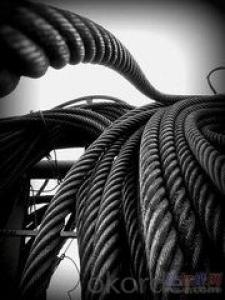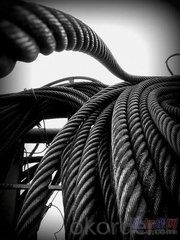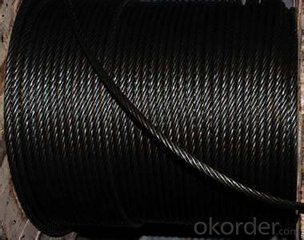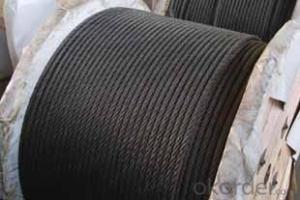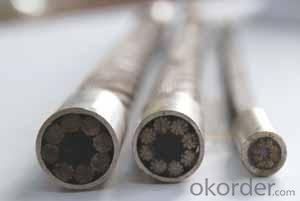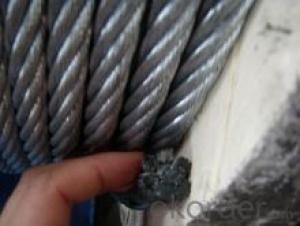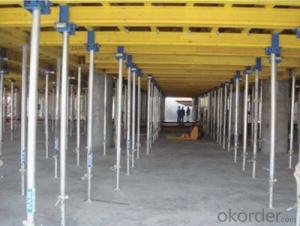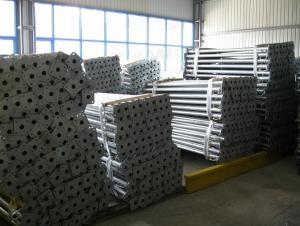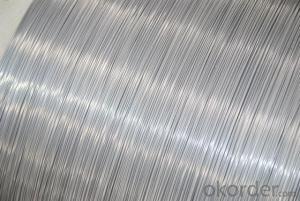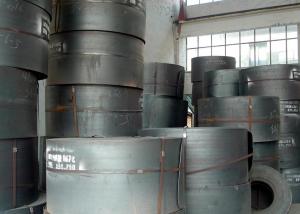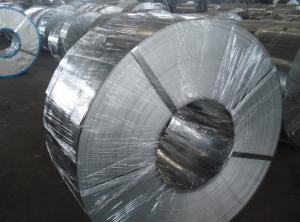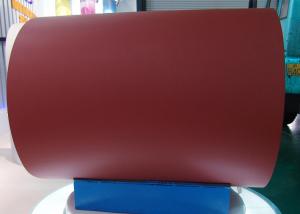STEEL WIRE ROPE FOR LIFTING
- Loading Port:
- China Main Port
- Payment Terms:
- TT OR LC
- Min Order Qty:
- -
- Supply Capability:
- -
OKorder Service Pledge
Quality Product, Order Online Tracking, Timely Delivery
OKorder Financial Service
Credit Rating, Credit Services, Credit Purchasing
You Might Also Like
- Q: What are the different types of steel fasteners and their uses in the marine industry?
- In the marine industry, there are several types of steel fasteners commonly used. These include stainless steel fasteners, galvanized steel fasteners, and titanium fasteners. Stainless steel fasteners are highly resistant to corrosion and are suitable for use in environments with high levels of moisture and saltwater exposure. They are often used in marine applications such as boat building, dock construction, and offshore structures. Galvanized steel fasteners are coated with a layer of zinc to provide corrosion resistance. They are commonly used in marine applications where stainless steel might be too expensive or unnecessary, such as in non-submerged parts of boats or in marine infrastructure projects. Titanium fasteners are lightweight, yet incredibly strong and corrosion-resistant. They are commonly used in high-performance marine applications, such as racing yachts or other vessels that require components with exceptional strength-to-weight ratios. Overall, the selection of steel fasteners in the marine industry depends on the specific requirements of the project, the level of exposure to saltwater and moisture, as well as factors such as cost and performance.
- Q: How is steel wire galvanized?
- Steel wire is galvanized through a process called hot-dip galvanizing. In this method, the steel wire is first cleaned to remove any impurities and then dipped into a bath of molten zinc. The zinc coating bonds with the steel wire, creating a protective layer that helps prevent corrosion and rust. The wire is then cooled and ready for various applications.
- Q: What are the common uses of steel in the food processing industry?
- Steel is commonly used in the food processing industry for various purposes such as manufacturing machinery and equipment, constructing food storage tanks, making food preparation surfaces, and creating durable and hygienic utensils and cutlery.
- Q: How is steel used in the production of electrical appliances and wiring?
- Steel is commonly used in the production of electrical appliances and wiring as it provides a strong and durable framework for various components. It is often used in the construction of appliance casings, motor housings, and brackets, ensuring the safety and protection of internal electrical components. Additionally, steel is used in electrical wiring as a support structure, providing strength and stability to carry and distribute electricity effectively.
- Q: What are the applications of alloy steel in manufacturing?
- Alloy steel is widely used in manufacturing due to its exceptional properties and versatility. It is utilized in various applications such as the production of machinery, automotive parts, tools, construction materials, and even in the aerospace industry. The high strength, durability, and resistance to corrosion and wear make alloy steel ideal for manufacturing components that require high tensile strength, toughness, and the ability to withstand harsh environments. Additionally, alloy steel can be easily machined, welded, and heat-treated, allowing for greater flexibility in the manufacturing process.
- Q: What are the different types of steel bolts and their uses?
- There are various types of steel bolts, each designed for specific applications. Common types include: 1. Hex bolts: These bolts have a hexagonal head and are used in a wide range of applications. They provide a secure fastening and are commonly used in construction, machinery, and automotive industries. 2. Carriage bolts: These bolts have a smooth, rounded head and a square neck beneath it. They are commonly used in wood-to-wood connections, such as in furniture assembly or construction. 3. Eye bolts: These bolts have a looped head, allowing for the attachment of ropes, cables, or chains. They are often used for lifting heavy loads or securing equipment. 4. U-bolts: These bolts have a U-shape and are commonly used to secure pipes or other round objects to a surface. They are often used in plumbing, automotive, or construction applications. 5. Toggle bolts: These bolts have a spring-loaded wing design that allows for easy installation in hollow materials such as drywall. They are often used for hanging lightweight objects on walls. 6. Stud bolts: These bolts have no head and are threaded on both ends. They are commonly used in flange connections, where they provide a firm and secure joint. Each type of steel bolt has its specific uses and applications, and selecting the right one ensures proper fastening and reliability in various industries.
- Q: How are steel products used in the mining industry?
- Steel products are used extensively in the mining industry for a variety of purposes. They are used to construct structures such as mine shafts, tunnels, and processing plants. Steel is also used in the fabrication of equipment like drills, excavators, and crushers, as it provides strength and durability. Additionally, steel is used in the production of pipelines, conveyor belts, and storage tanks for transporting and storing mined materials. Overall, steel products play a crucial role in the mining industry, providing the necessary infrastructure and machinery for efficient and safe operations.
- Q: What are the applications of steel in the marine industry?
- Steel is widely used in the marine industry due to its exceptional strength, durability, and corrosion resistance properties. It is employed in the construction of ship hulls, decks, and superstructures, providing structural integrity and ensuring the vessel's longevity in harsh marine environments. Additionally, steel is utilized in the fabrication of marine equipment, such as propellers, shafts, and rudders, contributing to efficient propulsion systems and smooth navigation. Its applications in the marine industry are crucial for ensuring the safety, reliability, and performance of various maritime vessels and structures.
- Q: What are the advantages of using steel in the manufacturing of playground equipment?
- There are several advantages of using steel in the manufacturing of playground equipment. Firstly, steel is highly durable and can withstand heavy use and extreme weather conditions, making it ideal for playgrounds that are exposed to constant wear and tear. Additionally, steel is rust-resistant, which ensures the longevity and safety of the equipment. Furthermore, steel allows for versatile and intricate designs, allowing manufacturers to create a wide range of engaging and stimulating playground structures. Lastly, steel is a sustainable and environmentally-friendly material as it can be recycled, reducing the impact on natural resources.
- Q: What are the different types of steel shelving and storage systems available?
- There are several different types of steel shelving and storage systems available, including boltless shelving, wire shelving, pallet racking, and mezzanine systems. Each type has its own unique features and benefits, making them suitable for various storage needs. Boltless shelving is easy to assemble and adjust, wire shelving allows for better visibility and air circulation, pallet racking is ideal for storing large and heavy items, and mezzanine systems provide additional storage space by utilizing vertical space in a warehouse or facility.
Send your message to us
STEEL WIRE ROPE FOR LIFTING
- Loading Port:
- China Main Port
- Payment Terms:
- TT OR LC
- Min Order Qty:
- -
- Supply Capability:
- -
OKorder Service Pledge
Quality Product, Order Online Tracking, Timely Delivery
OKorder Financial Service
Credit Rating, Credit Services, Credit Purchasing
Similar products
Hot products
Hot Searches
Related keywords
